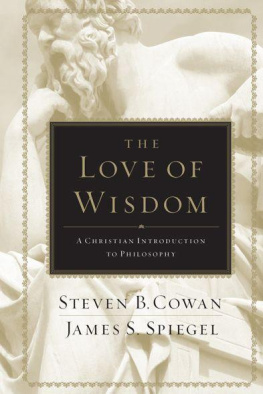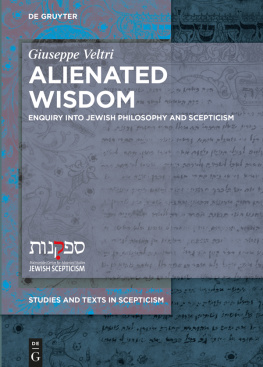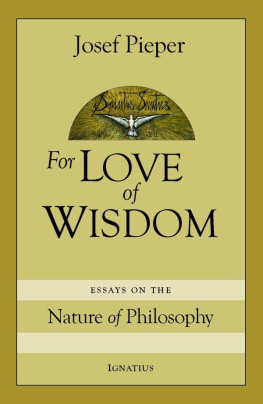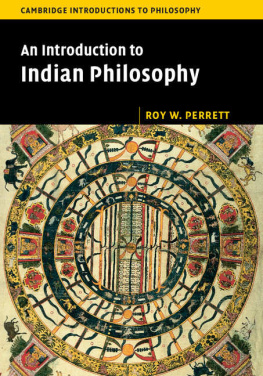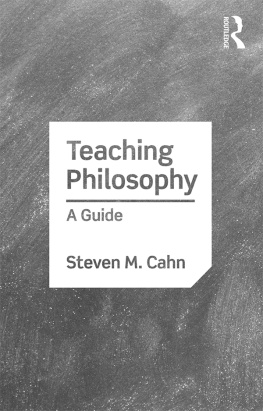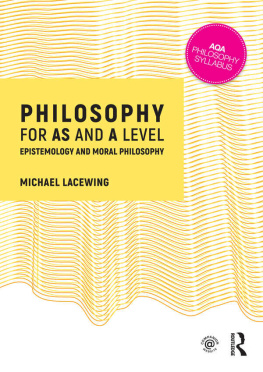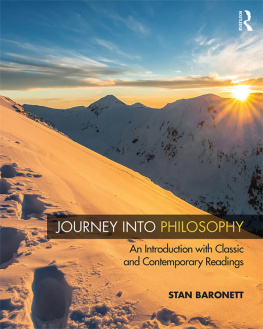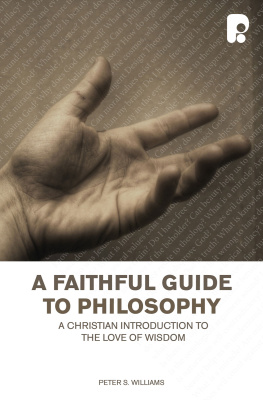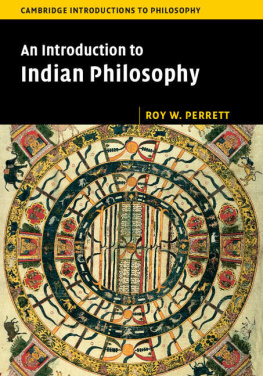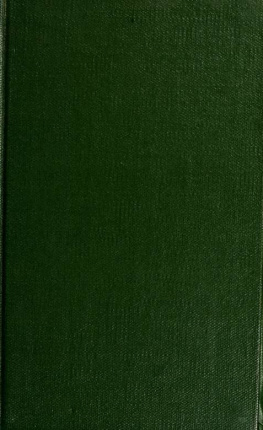


CONTENTS
ACKNOWLEDGEMENTS
A work like this would not be possible without the help and support of many other people. We wish therefore to extend to everyone who played a part in its production our sincerest, heartfelt gratitude.
I (Steve) wish first to thank my beautiful wife, Ronda, and our extraordinary son, Oliver, for the many hours they spent away from me while I completed my part of the manuscript. Their sacrifice will not go unrewarded either in this life or the one to come. Ronda also deserves praise for reading many pages of that philosophy stuff so I could make sure the material is accessible to the nonspecialist. I also extend my gratitude to my colleagues and students at Southeastern Bible College who encouraged me throughout this project and allowed me the time to work on it.
I (Jim) would like to thank my wonderful wife, Amy, whose consistent support and encouragement are crucial to my livelihood as a teacher and writer. Thanks also to my children, Bailey, Samuel, Magdalene, and Andrew, whose affection blesses me in ways they will never know. I am also grateful to the good people of New Life Presbyterian Church in Yorktown, Indiana, and to my colleagues and students at Taylor University. These are special Christian communities of which I am privileged to be a part. Whatever professional success I enjoy is due in no small part to their faithfulness and good will.
We also wish to thank the editorial staff at B&H, especially Ray Clendenen and Terry Wilder, for their encouragement throughout this project and their superb editing of the manuscript. We are grateful as well to Thomas Senor and J. P. Moreland for their comments and suggestions on various parts of the manuscript. It is a much better book because of their input (though we take responsibility for any remaining flaws). Thanks also to Alyssa Lehr and Michael Glawson, who prepared the glossaryour students will no doubt be grateful, too.
We want to acknowledge the following publishers for their generous permission to use previously published material. Thanks to Crossway Books for parts of chapters three, five, and six, which were drawn from Spiegel's book The Benefits of Providence. Thanks to the publisher of Science and Christian Belief f or portions of chapter three, to the publisher of Philosophia Christi for parts of chapter three, to the publisher of Areopagus Journal for some sections of chapter nine, and to Blackwell Publishing for portions of the introduction and chapter six. And, while we are on the subject of publishing, we should note here that we used the Holman Christian Standard Bible translation wherever Scripture is quoted, except where otherwise indicated.
Finally, we would like to acknowledge two individuals who have left an indelible imprint on our lives with regard to philosophical studies and Christian living. Steve and Jim dedicate this book, respectively, to Thomas Senor and Wynn Kenyon, both of whom are model professors, mentors, and lovers of wisdom.
Introduction
What Is Philosophy?
M any years ago there was a popular song which posed life's most fundamental philosophical question:
What's it all about, Alfie?
Is it just for the moment we live?
What's it all about
When you sort it out, Alfie?
What is it all about? In other words, what is the meaning of life? What makes this question so challenging is the fact that to answer it properly one must answer several other difficult questions: What are human beings? Where did we come from? Are we responsible for how we live? What happens after we die? Is there a God? If so, what is God like? Can we know the answers to such questions? Can we know anything at all?
These are sometimes called the Big Questions in the sense that they are the most important questions one can ask. Whatever else you might want to find out during your brief time on this planet, these are questions for which you should seek answers. Ironically, many people work hard to avoid dealing with such questions, either because they find them too difficult or because they fear the answers they might discover. But, of course, these are poor excuses for not looking for ultimate meaning in life.
This book is all about the Big Questions. In this sense, you might say, this book is all about what life is all about. We will explore issues about who we are, where we came from, who made us, where we are going, whether we are free, how we should live, why we suffer, the value of beauty, the nature of goodness, and the nature of God. And we will consider the wide variety of answers that have been given to all of these questions. In discussing the issues we aim to be fair, but we will not pretend to be neutral. We are Christian philosophers, and our distinctive worldview will directly impact how we deal with most issues. Of course, all authors of textbooks write from the perspective of a particular worldview. As one philosopher recently put it, there is no view from nowhere.
Philosophical Method
Our aim, as the book's title suggests, is to introduce you to philosophy in the original sense of the word the love of wisdom (from the Greek philo and sophia). Philosophy is properly about more than acquiring an intellectual grasp of answers to life's Big Questions. It is about gaining insights which culminate in a life well-lived. Good philosophers not only think well but live virtuously. In this sense, we share the same mission as the most famous philosopher in Western history.
The Life of Socrates
Socrates (469399 BC) lived in a time and place in which there was social upheaval and increasing cynicism about the meaning of life. He became famous (or infamous) in ancient Greece for accosting people on the street with inquiries about truth, goodness, knowledge, and many other issues. But he did not do so for the sake of idle entertainment. Rather, these impromptu interviews were inspired by a pronouncement by the Oracle at Delphi, who supposedly spoke for the god Apollo. The oracle declared that Socrates was the wisest man in all of Athens. When news of this got back to Socrates, he scoffed, insisting that there were many Athenians much wiser than he. But when some insisted that it was so, he set out to disprove the oracle. The best way to do so, he figured, would be to find someone who could answer some of the questions about which he was ignorantquestions about the nature of truth, goodness, knowledge, and so on. And so began the random Socratic interviews on the streets of Athens.
What Socrates learned in the process surprised him. He interviewed all kinds of people, without discriminating on the basis of reputation or social standing. He discovered that those who were purported to be most wise had fewer reasons for their beliefs and were less patient than the so-called ignorant. But in every case he found that no one had any better answers to his questions than he did. All were alike ignorant about the basic philosophical issues he raised. But those he interviewed did not perceive their own ignorance, whereas Socrates knew he was ignorant. All I know is that I know nothing, he declared. His fellow Athenians did not even know this much about themselves. Thus, he realized, the Oracle was correct after all. Socrates was indeed the wisest man in all of Athens. For it is better to know you are ignorant than to be ignorant and think otherwise.
The publicans and other esteemed Athenians began to resent Socrates' constant questioning. Not only did it reveal their own ignorance, but they feared this would undermine their political authority. Eventually, Socrates was indicted for impiety. More specifically, Socrates was charged with (1) introducing unfamiliar religious practices and failure to worship the state gods and (2) corrupting the youth at Athens. The first charge concerned Socrates' skepticism about the Greek pantheon of gods and his conviction that there was actually one God who will ultimately judge us all. The second charge pertained to the fact that Socrates developed a large following of young people, many of whom were impressed by their mentor's life and philosophical methodology. One of these was a young man by the name of Plato.
Next page
